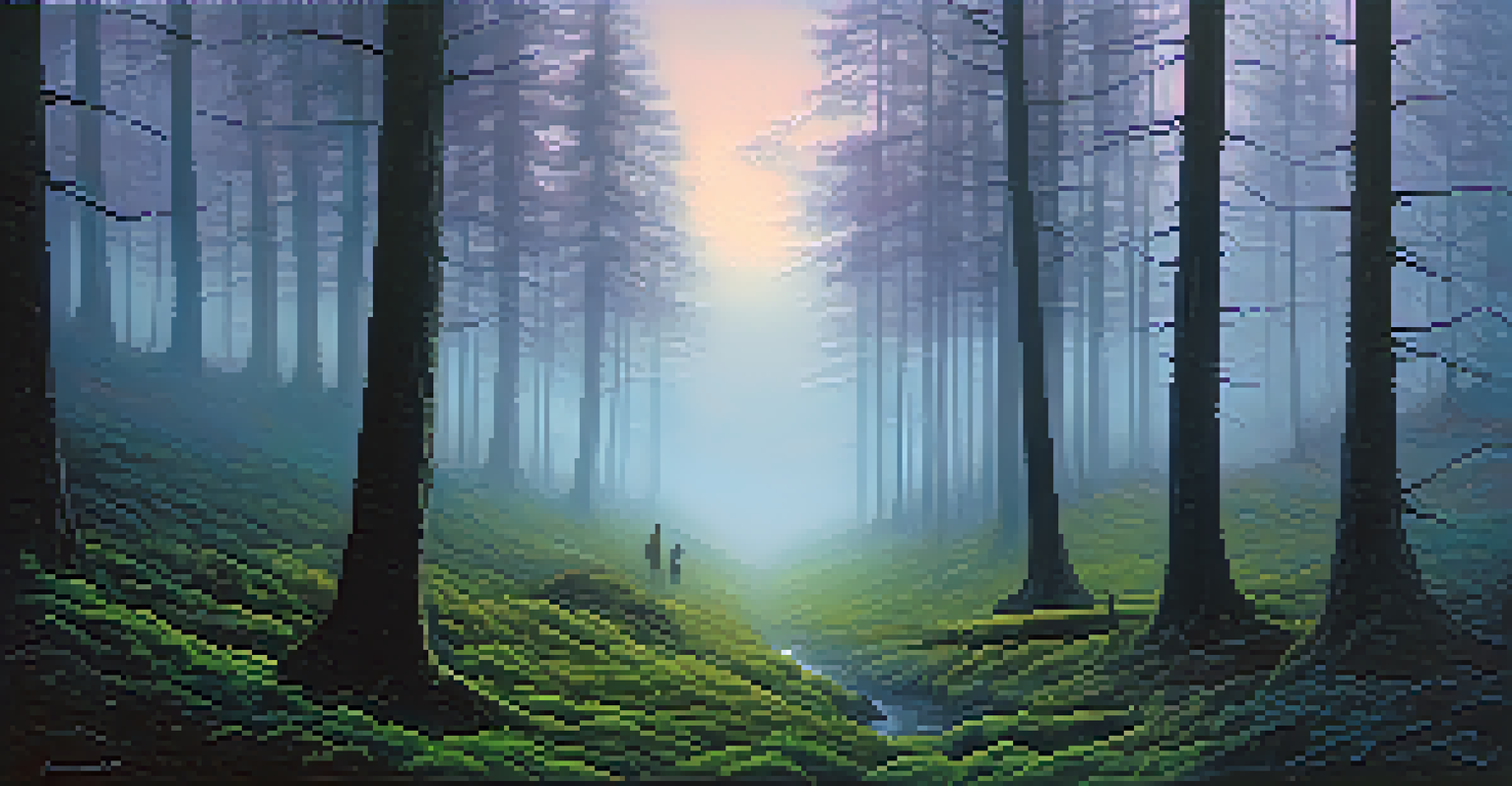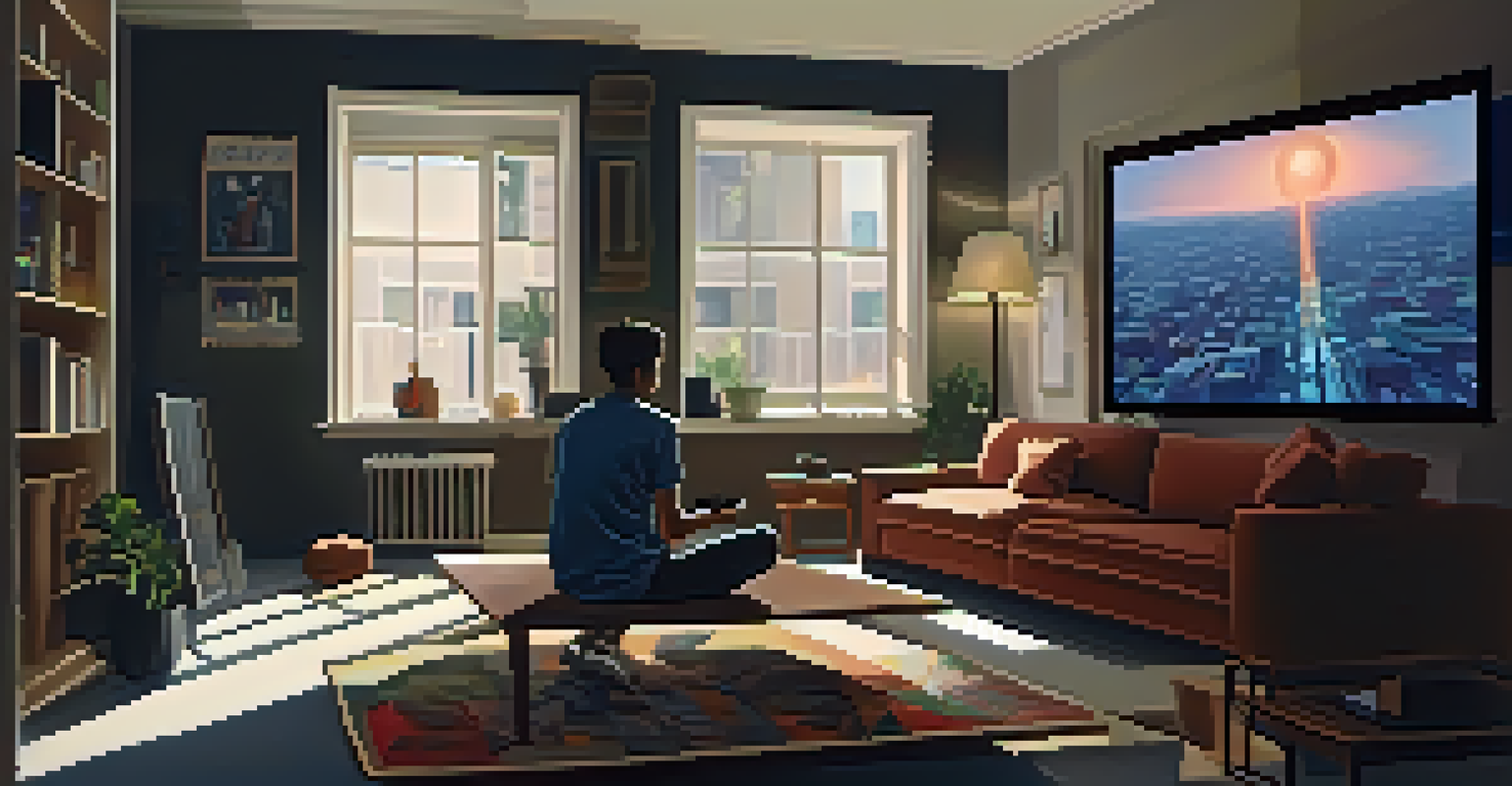How Horror Films Reflect Societal Fears and Anxieties

The Historical Roots of Horror in Society
Horror films have a long-standing history, often reflecting the values and fears of the time. From early silent films to today’s blockbusters, these movies serve as a mirror to societal anxieties. For instance, the rise of the vampire genre during the Victorian era highlighted fears surrounding sexuality and the unknown.
Horror films are a reflection of the fears and anxieties of society, serving as a mirror to our collective psyche.
As societies evolve, so do their fears, and horror films adapt accordingly. The 1950s saw a surge in alien invasion movies, reflecting Cold War fears of the unknown and the threat of communism. This evolution shows how filmmakers tap into collective worries, creating narratives that resonate with audiences.
By examining the historical context of horror films, we can better understand why certain themes dominate specific eras. These films not only entertain but also provoke reflection on societal issues, making them a powerful commentary on human fears.
Fear of the Unknown: A Common Theme
One of the most prevalent themes in horror films is the fear of the unknown. This fear often manifests in stories about monsters, ghosts, and otherworldly beings, tapping into our primal instincts. Movies like 'The Blair Witch Project' and 'It Follows' exemplify how the unknown can be more terrifying than what we can see.

The concept of the unknown can be a powerful metaphor for various societal anxieties, such as changes in technology or shifts in cultural norms. For example, the rise of the internet has birthed a new wave of horror films that explore the dark side of technology, reflecting our fears about privacy and connection.
Horror Mirrors Societal Fears
Horror films often reflect the societal values and anxieties of their time, evolving alongside cultural shifts.
By confronting the unknown through horror, we can also explore our personal insecurities. These films challenge us to face what scares us, ultimately serving as a cathartic experience for audiences grappling with their fears.
Socioeconomic Fears Depicted in Horror Films
Horror films often delve into socioeconomic issues, highlighting disparities and struggles faced by different classes. Movies like 'Get Out' and 'Parasite' tackle themes of racism and class division, illustrating how horror can provide a platform for social commentary. These narratives resonate with audiences who may feel marginalized or threatened by societal structures.
Horror is not a genre, but a way of seeing the world—with a focus on the fears that live within us.
Through the lens of horror, filmmakers can critique the status quo and invoke a sense of urgency about pressing issues. For instance, the portrayal of wealthy characters in horror often serves to highlight the fears of those in lower socioeconomic classes. This exploration of class struggle adds depth to the horror experience, making it relatable and thought-provoking.
By incorporating socioeconomic fears into horror narratives, these films encourage audiences to reflect on their own realities. They serve as a reminder that fear can stem not only from supernatural elements but also from the very fabric of society.
Gender and Identity in Horror Narratives
Gender roles and identity are frequently examined within the realm of horror films. Many classic horror tropes, such as the 'final girl' or the victimized woman, reflect societal fears surrounding femininity and masculinity. Films like 'Halloween' and 'The Babadook' provide commentary on gender dynamics and the complexities of identity.
As discussions around gender and identity evolve, so do horror films. Recent releases have shifted the narrative to include more diverse perspectives, exploring themes of LGBTQ+ identity and representation. This shift not only reflects societal changes but also invites audiences to engage with a broader range of experiences.
Exploring the Unknown in Horror
The fear of the unknown is a central theme in horror, allowing audiences to confront personal insecurities and broader societal anxieties.
By challenging traditional gender roles, horror films can provoke important conversations about identity. They provide a space to explore the complexities of human experience and the fears that arise from societal expectations.
Technology and Its Role in Modern Horror
In our increasingly digital world, technology has become a significant source of fear in horror films. The rise of social media and smartphones has transformed the genre, giving birth to films like 'Unfriended' and 'Cam' that explore the dark side of connectivity. These narratives tap into modern anxieties about privacy, surveillance, and the impact of technology on relationships.
Horror films often reflect our fears about losing control in a digital age. The idea of being manipulated or surveilled by technology can evoke a sense of helplessness, making these films resonate with audiences. They serve as cautionary tales about the potential dangers lurking behind our screens.
By addressing technology's role in our lives, horror films provide a unique commentary on contemporary fears. They force us to confront the implications of our digital existence and the unsettling potential of technology.
Cultural Reflections in Global Horror Cinema
Horror films vary greatly across cultures, offering unique insights into the fears and anxieties of different societies. For example, Japanese horror often focuses on themes of isolation and the supernatural, reflecting cultural beliefs about spirits and the afterlife. Films like 'Ringu' showcase how cultural traditions can influence the horror genre.
Similarly, Western horror often emphasizes individualism and personal fears, such as those seen in slasher films. This contrast highlights the diverse ways in which horror can serve as a reflection of societal values and fears. By studying global horror cinema, we can gain a broader understanding of human anxieties.
Horror as Social Commentary
Many horror films address socioeconomic and gender issues, providing a platform for critique and reflection on various societal struggles.
Cultural reflections in horror films not only entertain but also educate audiences about different perspectives. They encourage us to appreciate the rich tapestry of human experience and the fears that unite us across borders.
The Psychological Impact of Horror Films
Horror films can have a profound psychological impact on viewers, often tapping into deep-seated fears and anxieties. The thrill of fear, coupled with the safety of being in a controlled environment, creates a unique experience for audiences. Many find that watching horror films can be a cathartic way to confront their fears.
Additionally, horror films often engage with psychological themes, exploring the human mind's complexities. Movies like 'Hereditary' delve into family trauma and grief, illustrating how horror can reflect and amplify personal fears. This connection can lead to a deeper understanding of one’s anxieties.

As audiences engage with these films, they may find themselves reflecting on their own fears and experiences. Horror serves as both a mirror and a lens, allowing viewers to confront their emotions in a safe space.